Words: Gina Morris, Photographer: Mick Hutson
Taken from Select Magazine, August 1996
The mission: to take New York, see off the last aftershocks of that Brit awards palaver and wedge Pulp's cuban heels in the American door. The chief agent: Jarvis Branson Cocker, stick-thin Sheffield sage and global star-in-waiting. But did he remember to pack his bullet-proof vest?
The story goes that, as a young boy, Jarvis Cocker spent his days dreaming of stardom. Spending his years training to be the perfect pop star, figuring the moves, the style, interview techniques... and, naturally, the cultural significance of his own tragic demise.
"Part of being famous," he explains, pushing his damp fringe awkwardly to one side, "is wanting people to be really upset when you die. You want to have a state funeral and be paraded through the streets and have everybody crying and throwing flowers on the coffin, and they declare the day you died a National Holiday..." He suddenly looks vexed. "But if, on my gravestone, they carved 'Here lies Jarvis Cocker - He Invaded Michael Jackson's Stage', then I would be very disappointed. I would consider that a bit of a failure."
Pulp are in America, halfway through their first headline tour, and the national music press are declaring a Third British Invasion. Thanks to the triumph of Oasis and their "timeless rock 'n' roll riffs", the climate is rather more Britfriendly than in recent years - and Pulp, ranked among the pack-leaders snapping at the Gallaghers' heels, have already acquired a notoriety of their own.
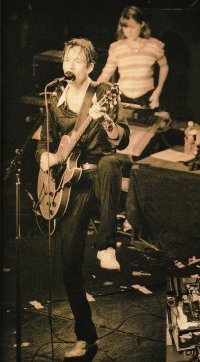 "Meet the man who mooned Michael Jackson," welcomes The New York Daily. "The episode has taken on a mythical quality," says Musician magazine. Indeed, as inadvertent career moves go, Jarvis at the Brit Awards is fast becoming the indie equivalent of Hugh Grant on Sunset.
"Did that really work for him?" Jarvis gasps, pouring himself a drink from the band's rider. "So, that's all you have to do, get sucked off in a car and that's your career sorted?" He pauses a while, maybe wishing he'd thought of it 16 years ago. "I don't know, it probably has helped here because it's made people aware of who we are. Then again, if you get people coming to see you because of that it's not a very good reason, is it? 'Oh, this is the guy that wiggled his bottom in front of Michael Jackson...'"
"Meet the man who mooned Michael Jackson," welcomes The New York Daily. "The episode has taken on a mythical quality," says Musician magazine. Indeed, as inadvertent career moves go, Jarvis at the Brit Awards is fast becoming the indie equivalent of Hugh Grant on Sunset.
"Did that really work for him?" Jarvis gasps, pouring himself a drink from the band's rider. "So, that's all you have to do, get sucked off in a car and that's your career sorted?" He pauses a while, maybe wishing he'd thought of it 16 years ago. "I don't know, it probably has helped here because it's made people aware of who we are. Then again, if you get people coming to see you because of that it's not a very good reason, is it? 'Oh, this is the guy that wiggled his bottom in front of Michael Jackson...'"
Reason enough, it seems. Tonight, outside Pulp's 1,000-capacity, sold-out show in New York's Irving Plaza, touts are shifting $16 tickets for upwards of $50. A group of young girls have been queuing all day in the lashing rain, in the hope of glimpsing their new English hero. "I heard Jarvis had an 18-inch waist," says one, attempting, to define the band's appeal. "That's so cool. He has the greatest anatomy." "They're fun," declares another. "So much more fun than American bands who are always trying too hard to be cool." And what of Jarv's wit, his worldview, his shrewd class-and-subculture related observations? They stare blankly. "Erm ... well, he is kinda funny."
Fun, funny and teeny of waist he may be, but a great deal of time, money and energy is being invested in selling Jarvis Cocker to America. To date, Pulp have released just one single here, the current release 'Common People'. 'His 'N' Hers' and 'Different Class' maybe UK super-sellers, but neither has charted here. Thankfully, the story soon gets better: "MTV take us very seriously," says manager Geoff Travis, doing a bit of hang-outery in the foyer of the Paramount Hotel. "There are continual news stories about the tour and obviously, a huge amount of stuff about the Michael Jackson thing."
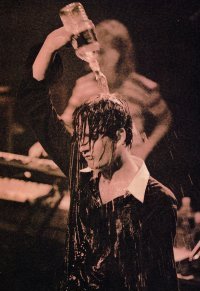
Travis, whose previous US bust-outs have included The Smiths and The Cranberries, has found a different story with Yankee radio, however. More than 30 stations are playing the single, including Chicago's muscular 10. But many more are still undecided about buying into Yorkshire-raised glam-pop. Meanwhile, the tour has attracted a stream of glowing press, the oddest plaudit coming from Women's Wear Daily, the Koran of the US fashion industry who reportedly greeted Pulp's visit as "the fashion event of the year".
"True," confirms Travis delightedly. "Absolutely true. They just adopted Pulp." Perhaps stranger still is the overwhelming sense of support for Jarvis vis-a-vis the Jacko hoohah. Travis believes that feedback over here has been firmly pro-Jarv: "I think it was probably 80 per cent positive. There was the feeling that this was the right thing to do, the
punk-rock thing to do." The only serious setback has been the illness which incapacitated Jarv while in Hawaii. "He got some sort of bug with an unpronounceable name and was very ill. We cancelled one gig... we shouldn't have let him do LA or San Francisco, but he insisted."
On the upside, the band's most significant breakthrough has been their appearance performing 'Common People' on the achingly influential David Letterman show. The feeling is that, while slaying America is hardly Pulp's be-all and end-all, as long as they're over here, they intend to do the job in the manner of hard-grafting émigrés. Appointing legendary manager Peter Rudge - a veteran of classic Stones and Who tours - to handle the band's American manoeuvres is another sign of the seriousness with which they view the job. For the moment, Travis is broadly positive: "They've made another step forward. We've yet to see whether it translates into the big bad world of record sales, but I think our cult status is affirmed."
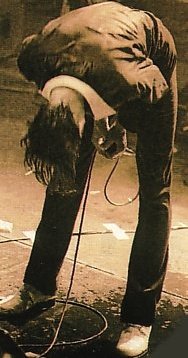 Upstairs in the venue, Jarvis sits in the band's dressing room hunched on a chair, trying to dry off from the torrential rain. A few weeks ago, he was considering wearing a bullet-proof vest on stage, convinced he was going to get shot by lunatic Jacko fans. "I didn't really want to come here at all," he drawls, rubbing his damp trousers aggressively. "There were two reasons: last time we came here, two years ago when we supported Blur, we thought there was no point in coming back. We thought America had its own values and what we were doing was surplus to requirements. And then there was the Jackson thing, but in the end that turned out to be a false alarm. Apart from a few people with banners outside the David Letterman show, we haven't had any real trouble at all."
Upstairs in the venue, Jarvis sits in the band's dressing room hunched on a chair, trying to dry off from the torrential rain. A few weeks ago, he was considering wearing a bullet-proof vest on stage, convinced he was going to get shot by lunatic Jacko fans. "I didn't really want to come here at all," he drawls, rubbing his damp trousers aggressively. "There were two reasons: last time we came here, two years ago when we supported Blur, we thought there was no point in coming back. We thought America had its own values and what we were doing was surplus to requirements. And then there was the Jackson thing, but in the end that turned out to be a false alarm. Apart from a few people with banners outside the David Letterman show, we haven't had any real trouble at all."
Downstairs, as the crowd files in, you can almost hear the anticipation escalating. But the apparent excitement is misleading: like London, New York is an inaccurate representation of the country. "We did a concert in Los Angeles," Pulp guitarist and keyboard player Mark Webber explains, as he selects his show clothes from the band's wardrobe trunk. "It was when Jarvis' illness was very pronounced. He was pushing himself to perform and it was the best concert we've played in ages. The next day in the LA Times, the review said, 'The frontman was devoid of personality'." He laughs and shakes his head. 'And the show we did in St Louis was the most embarrassing concert of my life. It was a free festival in an amphitheatre and we played on the second stage in the car park to a queue of people trying to get in. Ten people had come to watch us and the rest just scowled."
Fortunately, only a handful of the gathered mass have paid to scowl. It's now showtime: the lights dim, the kid-pleasing video screen is raised and the stage, in all its basic charm, is unveiled. In stark contrast to the band's recent British arena tour, there are no fancy lights, no stairs, not even a backdrop. Frankly, Pulp are on their own. Russell, Steve, Mark, Nick and Candida take their places. Minutes later, Jarvis - in a black Playboy-emblazoned shirt - strolls out to a huge cheer, salutes the crowd and slips into 'I Spy'.
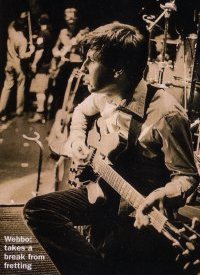 "I hope you're not too damp," he pronounces as the cheers subside. "If the island floods we've got lifeboats outside. We'll be the last people alive in New York. We could start a strange-cargo cult." Jarvis is spectacularly on form tonight, and although some of his witticisms and lyrical explanations are blankly received, most cross the divide. "This one is about waking up in the morning," he continues. "For a few minutes everything seems alright, then you remember what you did the night before. And you want to stay in bed and never get up. Which is what I did for three years of life... and look where it got me." By the time Pulp reach the encore of 'Disco 2000', the show has entered the realm of the wildly surreal. The enormity of 'Common People' and 'Sorted For E's & Wizz', casts the group as the best Pulp covers band ever. A rendition of 'Mis-Shapes' and it's all over. A success. One particular scowler, a local music magazine employee, is won over. "They rock," she concedes. "But they're not like us."
"I hope you're not too damp," he pronounces as the cheers subside. "If the island floods we've got lifeboats outside. We'll be the last people alive in New York. We could start a strange-cargo cult." Jarvis is spectacularly on form tonight, and although some of his witticisms and lyrical explanations are blankly received, most cross the divide. "This one is about waking up in the morning," he continues. "For a few minutes everything seems alright, then you remember what you did the night before. And you want to stay in bed and never get up. Which is what I did for three years of life... and look where it got me." By the time Pulp reach the encore of 'Disco 2000', the show has entered the realm of the wildly surreal. The enormity of 'Common People' and 'Sorted For E's & Wizz', casts the group as the best Pulp covers band ever. A rendition of 'Mis-Shapes' and it's all over. A success. One particular scowler, a local music magazine employee, is won over. "They rock," she concedes. "But they're not like us."
"Jarvis didn't like the show," grumbles Mark, pouring himself a vodka and coke before the band head off to the aftershow party - to be held at a bar famed for its mashed potato. "I think he does it just to contradict me." Mere yards away, Jarvis - booked into tonight's hotel under the pseudonym Mr Sheffield - smiles to himself. The dressing room is fitted with wildly enthusiastic people, but he remains unswayed. "It was too loud and I kept thinking my ears were going to start bleeding," he muses. "But you know, sometimes that's the way it goes."
So why do most big bands always claim small venues are more fun? "Don't know," he ponders, dispensing thank-yous and shaking a progression of firm hands. "I'm not going to say it's better, because there is something that's quite exciting about playing to a big audience. But it's good to have a bit of variety and to actually be able to see people's faces again and direct particular lines to particular people. You can have more of a conversation instead of addressing this mass and wondering what's going to happen!"
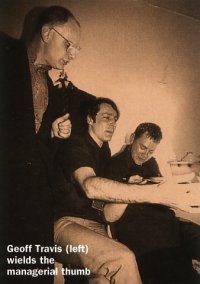 Steve Mackey bounds over, a glass of champagne in one hand, the bottle in the other "Are you ready to go to this party?" he yelps. Jarvis nods. Is he aware that not one member of the band said they'd like to swap places with him? "No one said they wanted to be me? I'm not surprised!" Would he want to be him? "No," he states flatly. "I wouldn't swap places with me either." He drags his weedy frame up from the sofa. Then he shakes his head and slips on his anorak. "Hmm," he concludes. "Terrible business."
Steve Mackey bounds over, a glass of champagne in one hand, the bottle in the other "Are you ready to go to this party?" he yelps. Jarvis nods. Is he aware that not one member of the band said they'd like to swap places with him? "No one said they wanted to be me? I'm not surprised!" Would he want to be him? "No," he states flatly. "I wouldn't swap places with me either." He drags his weedy frame up from the sofa. Then he shakes his head and slips on his anorak. "Hmm," he concludes. "Terrible business."
It's 9am the next morning and Steve and Jarvis are sprawled out on sofas in the lobby of the hotel. They didn't get back until gone five this morning, and they both look rather knackered. Steve is wearing shades and Jarvis is munching on an enormous bagel. He's suddenly pounced upon by a doorman: "You can't eat that in here, sir," he spits. "OK," replies Jarvis. "I'll put it in my pocket." The doorman smiles, with a sickening level of self-satisfaction. "Or," mumbles Jarvis as he saunters out of earshot, "I could stick it up your arse."
So we're back to rear-ends then, Jarvis. What would your mother say? "Nothing," he grins. "I've banned my mum from talking to the papers. She'd love to be a media celebrity, but I told her she wasn't allowed. I dunno, you work your whole life to get some sort of credibility; then your mother says to the press, 'Oh, he's a lovely lad, he'd never hurt anybody', and blows it all in 30 seconds. Cheers mum." The cab arrives, and Jarvis lurches out, past the doorman and out of the hotel. There's not a Jacko-loving suicide bomber in sight: for now, he's just another face on the streets of New York.
MARK WEBBER
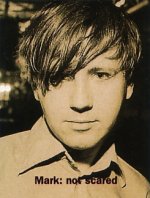
|
How do American fans differ from English fans?
"Well, the American fans have all got computers and they talk about us on the Internet. Jarvis was given a get well card made up from all the messages people had left on there."
Jarvis was worried about being shot. Do you feel in danger by association?
"No. I'm not sure if he's still scared. I know he was before we got here. There were a few banners outside the David Letterman show when we played but we haven't seen any other hostility. I couldn't read what they said, but I did hear someone say 'Who was that?', and her friend said, 'It's that stupid English singer.'"
Do you ever think you'd like to swap places with Jarvis?
"No. I'd like to get the attention he gets from our crew, but not from all the people. He gets good presents and lots of girls trying to kiss him... I just get nail varnish."
Do you think Pulp will break America?
"If you mean will we get in the Top 20 - doubtful. Americans like fairly straightforward things and we're not that easy to understand. We only appeal to people who wish they were English. |
NICK BANKS
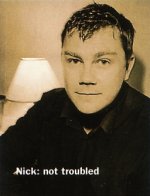
|
Has there been any trouble yet on the tour?
"Not really. We thought there'd be trouble in LA or here in New York, people trying to make a statement or something, but nobody seems bothered."
Would you like to swap places with Jarvis?
"No. I'm quite happy with my lot. I'd get too much attention; you wouldn't be able to calm down or slob out. People will always be expecting that big Jarvis quote or whatever, which is easy for him, because he does it all the time. He naturally walks into walls and trips over carpets."
Do you think Pulp will crack America?
"Probably not, no. We did a show in St Louis and saw the average American teenager at play, real Beavis And Butt-Head types. Just because we're playing to 1,000 people in New York, it doesn't mean there's going to be people in Arkansas who are going to be interested."
|
CANDIDA DOYLE
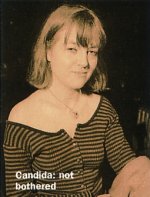
|
How are you affected by Cockergate?
"Well, sometimes if I go into a shop and they're playing a Michael Jackson record, or there are some obvious Jackson fans around. I always worry but then nobody knows I'm in Pulp anyway."
Do you think Pulp will break America?
"No. Not like Oasis anyway. I'm not that bothered. I do like coming to America, but it'd be nice to break it without having to put all the work in.
What's it like playing small venues after Wembley Arena?
"It is a better atmosphere in these kind of places, but I've got my standards now. I like catering and nice dressing rooms, hotels and champagne. We've played some real dives on this tour, where we've stayed on the bus until showtime, because the place is so horrible.
Do Americans fans bring you weird presents?
"Not really. I still get a lot of stuff meant for five-year-old children. I do like plastic jewellery and toys, but I've got so much now. Maybe I could set up my own shop."
|
 "Meet the man who mooned Michael Jackson," welcomes The New York Daily. "The episode has taken on a mythical quality," says Musician magazine. Indeed, as inadvertent career moves go, Jarvis at the Brit Awards is fast becoming the indie equivalent of Hugh Grant on Sunset.
"Did that really work for him?" Jarvis gasps, pouring himself a drink from the band's rider. "So, that's all you have to do, get sucked off in a car and that's your career sorted?" He pauses a while, maybe wishing he'd thought of it 16 years ago. "I don't know, it probably has helped here because it's made people aware of who we are. Then again, if you get people coming to see you because of that it's not a very good reason, is it? 'Oh, this is the guy that wiggled his bottom in front of Michael Jackson...'"
"Meet the man who mooned Michael Jackson," welcomes The New York Daily. "The episode has taken on a mythical quality," says Musician magazine. Indeed, as inadvertent career moves go, Jarvis at the Brit Awards is fast becoming the indie equivalent of Hugh Grant on Sunset.
"Did that really work for him?" Jarvis gasps, pouring himself a drink from the band's rider. "So, that's all you have to do, get sucked off in a car and that's your career sorted?" He pauses a while, maybe wishing he'd thought of it 16 years ago. "I don't know, it probably has helped here because it's made people aware of who we are. Then again, if you get people coming to see you because of that it's not a very good reason, is it? 'Oh, this is the guy that wiggled his bottom in front of Michael Jackson...'"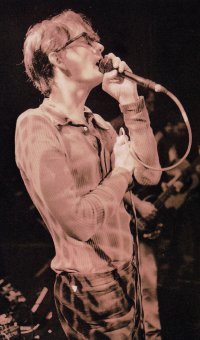 Who's Got The Bottle?
Who's Got The Bottle?
 Upstairs in the venue, Jarvis sits in the band's dressing room hunched on a chair, trying to dry off from the torrential rain. A few weeks ago, he was considering wearing a bullet-proof vest on stage, convinced he was going to get shot by lunatic Jacko fans. "I didn't really want to come here at all," he drawls, rubbing his damp trousers aggressively. "There were two reasons: last time we came here, two years ago when we supported Blur, we thought there was no point in coming back. We thought America had its own values and what we were doing was surplus to requirements. And then there was the Jackson thing, but in the end that turned out to be a false alarm. Apart from a few people with banners outside the David Letterman show, we haven't had any real trouble at all."
Upstairs in the venue, Jarvis sits in the band's dressing room hunched on a chair, trying to dry off from the torrential rain. A few weeks ago, he was considering wearing a bullet-proof vest on stage, convinced he was going to get shot by lunatic Jacko fans. "I didn't really want to come here at all," he drawls, rubbing his damp trousers aggressively. "There were two reasons: last time we came here, two years ago when we supported Blur, we thought there was no point in coming back. We thought America had its own values and what we were doing was surplus to requirements. And then there was the Jackson thing, but in the end that turned out to be a false alarm. Apart from a few people with banners outside the David Letterman show, we haven't had any real trouble at all." "I hope you're not too damp," he pronounces as the cheers subside. "If the island floods we've got lifeboats outside. We'll be the last people alive in New York. We could start a strange-cargo cult." Jarvis is spectacularly on form tonight, and although some of his witticisms and lyrical explanations are blankly received, most cross the divide. "This one is about waking up in the morning," he continues. "For a few minutes everything seems alright, then you remember what you did the night before. And you want to stay in bed and never get up. Which is what I did for three years of life... and look where it got me." By the time Pulp reach the encore of 'Disco 2000', the show has entered the realm of the wildly surreal. The enormity of 'Common People' and 'Sorted For E's & Wizz', casts the group as the best Pulp covers band ever. A rendition of 'Mis-Shapes' and it's all over. A success. One particular scowler, a local music magazine employee, is won over. "They rock," she concedes. "But they're not like us."
"I hope you're not too damp," he pronounces as the cheers subside. "If the island floods we've got lifeboats outside. We'll be the last people alive in New York. We could start a strange-cargo cult." Jarvis is spectacularly on form tonight, and although some of his witticisms and lyrical explanations are blankly received, most cross the divide. "This one is about waking up in the morning," he continues. "For a few minutes everything seems alright, then you remember what you did the night before. And you want to stay in bed and never get up. Which is what I did for three years of life... and look where it got me." By the time Pulp reach the encore of 'Disco 2000', the show has entered the realm of the wildly surreal. The enormity of 'Common People' and 'Sorted For E's & Wizz', casts the group as the best Pulp covers band ever. A rendition of 'Mis-Shapes' and it's all over. A success. One particular scowler, a local music magazine employee, is won over. "They rock," she concedes. "But they're not like us." Steve Mackey bounds over, a glass of champagne in one hand, the bottle in the other "Are you ready to go to this party?" he yelps. Jarvis nods. Is he aware that not one member of the band said they'd like to swap places with him? "No one said they wanted to be me? I'm not surprised!" Would he want to be him? "No," he states flatly. "I wouldn't swap places with me either." He drags his weedy frame up from the sofa. Then he shakes his head and slips on his anorak. "Hmm," he concludes. "Terrible business."
Steve Mackey bounds over, a glass of champagne in one hand, the bottle in the other "Are you ready to go to this party?" he yelps. Jarvis nods. Is he aware that not one member of the band said they'd like to swap places with him? "No one said they wanted to be me? I'm not surprised!" Would he want to be him? "No," he states flatly. "I wouldn't swap places with me either." He drags his weedy frame up from the sofa. Then he shakes his head and slips on his anorak. "Hmm," he concludes. "Terrible business."

